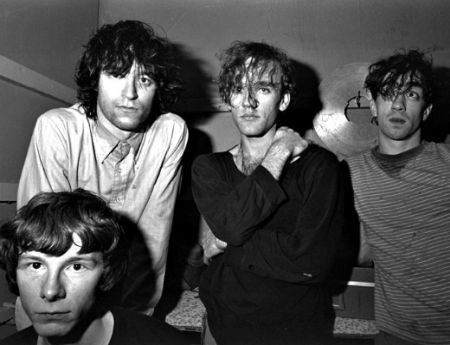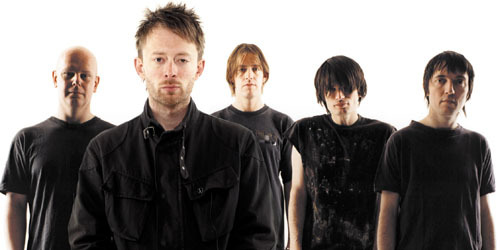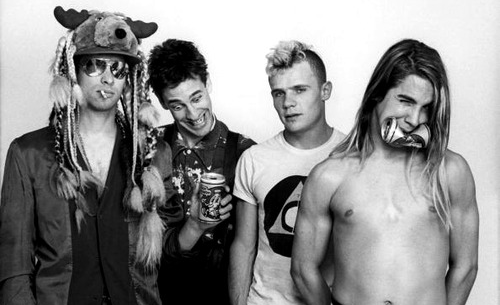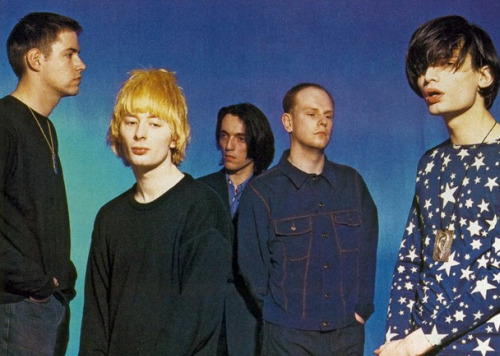1) Radio Free Europe; 2) Pilgrimage; 3) Laughing; 4) Talk About the Passion; 5) Moral Kiosk; 6) Perfect Circle; 7) Catapult; 8) Sitting Still; 9) 9-9; 10) Shaking Through; 11) We Walk; 12) West of the Fields
The IRS Vintage Years Edition bonus tracks: 13) There She Goes Again; 14) 9-9 (Live); 15) Gardening at Night (Live); 16) Catapult (Live)
So different from where the band would end up but contains such obvious traces of their entire development throughout. The kind of debut that creates a legacy.
Key tracks: "Radio Free Europe", "Perfect Circle", "Shaking Through"
There’s a lot of preconceptions flying around Murmur. It’s knee-deep in R.E.M.’s mumbling phase where Stipe mutters nonsense incoherently, befitting of the murkiness of the album cover. The phrase “college rock” gets bandied around a lot around this period too, which brings its own associations of ragtag indie groups. It’s also the debut album of a band with a long, long career ahead of them and whose - arguably - most famous works were a decade and a stylistic evolution away. Or maybe it’s just me and my own pre-assumptions, but based on my past experiences I was expecting R.E.M.’s first full outing to have little to do with the band I had known.
If you’ve come to this from Chronic Town, which already had some identifiable R.E.M.-isms in it, it probably doesn’t come as a surprise that a lot of those preconceptions are somewhat overstated, but the extent of how fully formed R.E.M. already are here is still notable. The songs are a little simpler here and there, but the album loves to throw surprises to mix things up: tracks where the arrangements and grasp of melody suddenly perk up with refinement, like the band had already been perfecting their art for years. The band that created “Shaking Through”, “Sitting Still” and “Laughing” is already miles away from the group of people behind Chronic Town; those songs also have some absolutely gorgeous moments lurking within, in particular the former with its superb vocal melodies and harmonies in its soaring chorus. Meanwhile “Talk About the Passion” is already R.E.M. as we know it, and a wonderful prelude to the more acoustic-based sound they’d become truly famous with. These are all songs where Murmur really comes alive, and they’re all classically R.E.M.-like moments where all the components of the band’s signature sound are already there and highlighted.
The best example of this is “Perfect Circle”, however. It’s Murmur’s big curve ball - an atmospheric, arrestingly beautiful and haunting mood piece driven by Mike Mills’ piano, full of misty-eyed melancholy and intimate vulnerability. It’s the kind of song that could have had a home in literally any R.E.M. album, regardless of decade - a song before its time, really. It’s very clearly a stylistic standout from the rest of Murmur, but yet there’s enough of its individual elements scattered across the album to make it feel at home in context. And it’s a brilliant song, of course - a great tune married to a great lyric, enunciated by Stipe clearly in a manner that makes the song a clear spotlight moment for him.
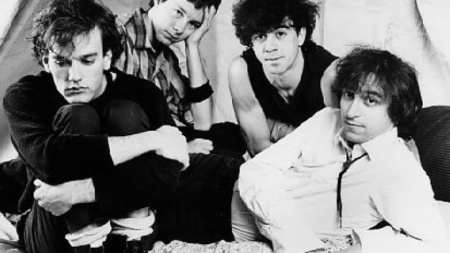
It’s a stormer of an opener, and sets way for a number of tracks in similar vein. “Pilgrimage” and the pounding “Catapult” are near-anthemic shout-alongs where Stipe commands the front with the kind of clarity that should bury the whole mumbling exaggeration, while “9-9” and “West of the Fields” are frantic high-speed numbers more reliant on their energy than anything. “West of the Fields” in particular has an almost-menacing urgency which gives the album a final punch of an ending, particularly as it launches after the quirky but fun almost-novelty singalong “We Walk”, which starts the band’s grand tradition of throwing something lighthearted out of nowhere amidst an album.
The most astonishing thing, though, is that Murmur was released in 1983 and it still sounds fresh today. Not only fresh, but unique. R.E.M. managed to cook up an album that at the same time lays the basic foundations for so many future bands yet sounds like none of them. Unlike so many other older classic albums which either sound incredibly dated or simply weaker when compared to the artists that took their inspiration from them and expanded and developed on the ideas, Murmur has its own sound even today and stands above the competition. The only thing that nibbles away its timelessness is the production but the music has no era, and even the production issues are fixed by the 2008 remaster which sounds gorgeous. It’s not just a fantastic start, but a classic album through and through.
This comes off as awkwardly abrupt after all that gushing over, but the IRS Vintage Years re-release which I happen to own adds practically nothing of major interest in terms of bonus tracks. There’s a cover of Velvet Underground’s “There She Goes Again” that’s thoroughly adequate but nothing to write home about, especially given R.E.M.’s tendency for rather faithful cover versions and my own particular aversions towards the VU. There are also three live tracks which are fine on the basis of the strength of the originals, but which offer nothing beyond that - “Gardening at Night” doesn’t feature on Murmur and is the best cut of the Chronic Town EP, so in that way it’s a handy bonus. By and far though, nothing particularly enticing. A better option is simply to spend a bit more money instead and get the aforementioned 2008 re-release, for the remastering job alone. Murmur has never sounded better.


